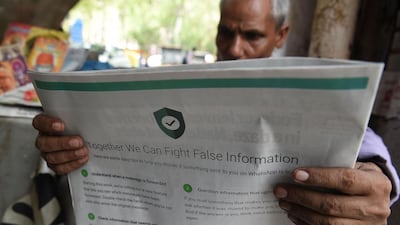A mob in eastern India beat a man to death after accusing him of kidnapping children, police said on Thursday, the latest in a recent spate of such attacks in the country.
About 150 people have been attacked since August 1 based on false kidnapping reports, some of them shared on WhatsApp. At least nine people died in the attacks and 135 others were injured, according to figures collated by local media.
Police said the latest victim was a 45-year-old man in eastern Jharkhand state who died after being beaten with sticks and shoes late on Tuesday.
"The rumour was going around in the village about child lifters roaming in the area. We have arrested five persons in the case," senior local police officer Prabhat Kumar told AFP.
The attack came a day after six other people were beaten up in the same state.
In late August, a pregnant deaf and mute woman was attacked in India's capital, New Delhi, by a mob who wrongly believed she was involved in kidnapping.
Lynchings are nothing new in India, but the spread of smartphones to even the most remote corners has enabled rumours to be shared quickly with large numbers of people through social media and messaging platforms.
The spate of attacks related to false rumours about child abduction began last year, prompting WhatsApp to roll out new safeguards – including limiting the number of users a message can be forwarded to.
The Facebook-owned platform, which has about 200 million users in India, also ran newspaper advertisements to raise awareness about fake news.
However, in the latest Jharkhand incident the rumour had not originated on WhatsApp, police said.
Over the past two years the state has seen repeated instances of lynchings of suspected child kidnappers sparked by rumours spread on the messaging service.

